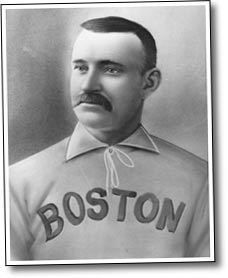|

|
| *Hall of Fame
Photo* |
Buffalo Bison 1880
Providence Grays 1881-85
Boston Beaneaters 1886-89
Boston Reds (PL) 1890
Cincinnati Reds 1891
Charley "Old Hoss" Radbourn's 1884 season defies modern conventional logic. All the right-hander did was start
and complete 73 games, winning a record 59 of them, pitch 678 2/3 innings, and strike out 441 batters. Remarkably, his
right arm was still attached to his torso when the season ended.
Charles Gardner Radbourn was born in Rochester, NY
on December 11, 1854. He began his major league career in 1880 with the National League's Buffalo Bisons, appearing
in six games as an outfielder and second baseman. He failed to impress the organization however, hitting just .143,
and was released.
Fortunately for Radbourn, the Providence Grays saw something in the 26 year old, signed him, and
made him a pitcher. The moved paid off immediately, as the rookie posted an outstanding 25-11 record and 2.43 ERA in
1881. He then backed up that strong performance with a 33 win campaign in 1882. The best, however, was yet to
come.
Radbourn entered the 1883 season as the Grays ace, and lived up to the billing, winning 49 games and finished
second in the league with a 2.05 ERA. The 1884 season did not begin well for the star hurler, as he developed a sore
arm in Spring Training and was pushed by 21-year-old prospect Charlie Sweeney. Radbourn quickly grew jealous of his
younger teammate.
Splitting the pitching duties with Sweeney (teams used two man rotations during that era), Radbourn's
season began in turmoil. Known as a heavy drinker and described as "erratic, capricious, and of bad character," Radbourn's
temper nearly cost him his job on July 16.
With the score tied 2-2, catcher Barney Gilligan dropped a third strike,
allowing the batter to reach first base. Radbourn became so upset with his receiver that he began to purposely throw
wild pitches which Gilligan was forced to fetch. Three runs scored during the meltdown, costing the Grays the game.
Understandably, Radbourn was suspended for the incident.
Soon after rumors began to spread that the volatile pitcher
was set to jump to St. Louis of the rival American Association. Whoever was spreading those rumors had their wires crossed,
however, as Sweeney, not Radbourn, ran out on his contract to St. Louis. Suddenly the Grays, in the midst of a pennant
race, were left without a pitcher and were forced to reinstate Radbourn.
The fans greeted their fallen star warmly
upon his return, and Radbourn began winning games at an unheard of rate. At one point the right-hander won 31 of 33
games, including 18 in a row, leading the Grays charge to the NL pennant.
"Old Hoss" finished his remarkable season
with a 59-12 record, giving him an amazing 107 wins over the past two seasons. Radbourn's work wasn't done yet
however, as he pitched every game of the Grays 3-0 sweep of the American Association's New York Metropolitans in an early
version of the "World Series".
(Note: The first official World Series between the American and National Leagues occurred
in 1903, which is why the term appears here in quotes)
Radbourn's historic season came with a price however, as his arm
was never the same. After posting a 28-21 record in 1885, the 30 year old was shipped off to the Boston Beaneaters (later
the Braves). During his four year stint in Boston, Radbourn's record was a mediocre 78-81.
Radbourn tasted glory
one final time in 1890, posting a 27-12 record for the pennant winning Boston Reds of the newly formed Players League.
When the league folded, he returned to the NL in 1891 with the Cincinnati Reds. After an 11-13 season, the sore armed hurler
retired.
Radbourn finished his career with a 309-195 record, 2.67 ERA, and 1,830 strike outs. Following his
playing days, he moved to Bloomington, IL and opened a pool hall. Three years later, the former baseball star lost an
eye during a hunting accident and became a recluse.
On February 5, 1897, Charley "Old Hoss" Radbourn died in one of
the dark, dank rooms in the back of his pool hall, he was just 42 years old. In 1939 his exploits on the diamond were
finally recognized, when the first Veteran's Committee elected him into the Hall of Fame along with some of his 19th Century
contemporaries.
-David Zingler, November 2003
Simply Baseball Notebook
DISCLAIMER: All pictures are assumed to be in the public domain.
No violation of copyright is intended here. If one of the photos above is not in the public domain, please notify us and it
will be removed.
|

